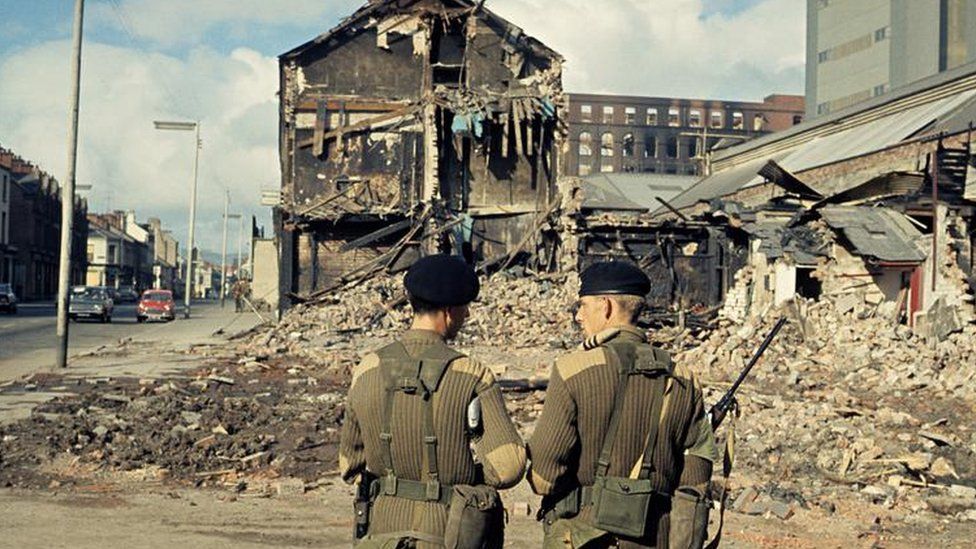
The Troubles was a period of conflict which lasted for 30 years and cost the lives of more than 3,500 people
By Julian O’Neill
BBC News NI crime and justice correspondent
Conditional immunity from prosecutions for Troubles-era crimes, contained in the UK government’s controversial Legacy Act, is in breach of the European Convention on Human Rights, the High Court in Belfast has ruled.
The full ruling, which runs to 200 pages, is continuing to be read out.
Opponents brought the legal challenge on several grounds.
These included the immunity aspect, which was passed by Parliament in September.
On Wednesday, a judge said: “There is no evidence that the granting of immunity under the act will in any way contribute to reconciliation in Northern Ireland, indeed the evidence is to the contrary.”
The case has been brought by relatives of victims and the survivor of a shooting.
The act involves a conditional amnesty for people suspected of crimes committed during the Troubles and introduces a ban on inquests and future civil actions related to the Troubles era.
Image source, Pacemaker
Victims’ families and survivors arrived at the High Court on Wednesday for the ruling
The government has argued the act is human rights compliant.
Those bringing the action disagree.
They claimed the legislation was unconstitutional and breached articles two and three of the European Convention on Human Rights (ECHR).
‘Complex case’
Speaking in the House of Commons, Northern Ireland Secretary Chris Heaton-Harris said the government would “take some time to consider” the ruling.
He said he remained committed to implementing the act.
Mr Heaton-Harris said it was a “complex case” that was likely to lead to further action in higher courts.
Shadow Northern Ireland Secretary Hilary Benn questioned how a new body set up to probe Troubles-related killings – the Independent Commission for Reconciliation and Information (ICRIR) – could proceed following the ruling.
The Labour MP added: “Given that immunity has always been presented as the central foundation of the Legacy Act, what do ministers intend to do about this judgment, and how can the commission become operational when one of its central powers has just been struck down?”
Mr Benn also asked Mr Heaton-Harris to extend the May deadline for Troubles-related inquests.
Lengthy legal challenge
Delivering his ruling, Mr Justice Colton said he was “satisfied that the immunity from prosecution provisions under section 19 of the act are in breach of the lead applicant’s rights pursuant to article 2 of the ECHR.
“I am also satisfied they are in breach of article 3 of the ECHR.”
Despite the ruling about the immunity clause – the judge said he was satisfied the ICRIR – could carry out human rights compliant investigations.
‘Refine our proposals’
Mr Justice Colton told the court he “fully [understood] the opposition to the new scheme and the reasons for it”.
But he said he could not at this point say that the ICRIR could not provide investigations in line with article two and article three of the ECHR.
“It has wide powers and wide range of discretion to carry out its reviews. Should it fall short of its obligations on articles two and three, I have no doubt they will be subject to the scrutiny of the court,” he said.
An ICRIR spokesperson said it would study the court’s ruling in detail.
Legal experts have speculated the challenge in the courts could take several years to exhaust, as it could be appealed all the way to the Supreme Court.
Separately, the Irish government is also taking a case against the UK at the European Court of Human Rights in Strasbourg.
Image source, Getty Images
Martina Dillon’s husband was shot dead by loyalists
The Belfast case was brought by Martina Dillon, John McEvoy, Lynda McManus and Brigid Hughes.
Ms Dillon’s 45-year-old husband, Seamus, was shot dead in a loyalist attack at the Glengannon Hotel in Dungannon, County Tyrone, in 1997.
Mr McEvoy survived a loyalist shooting on the Thierafurth Inn in Kilcoo, County Down, in 1992.
Ms McManus’s father, James, was among those wounded in the Sean Graham bookmakers massacre earlier the same year.
Ms Hughes’s husband, Anthony, was an innocent man killed as he drove into the SAS ambush of an IRA unit in Loughgall in 1987.
Amnesty International has supported their action.
The act is also opposed by victims’ groups and all political parties in Northern Ireland who argue it will remove access to justice.
Wednesday’s ruling was welcomed by the Social Democratic and Labour Party.
Speaking after the judgement, party leader Colum Eastwood said it was an important moment for victims and survivors.
“I am pleased for those who took this early case today, but I know they understand this is just the first hurdle in what is likely to be a longer legal dispute,” he said.
Alliance MP Stephen Farry called for the act to be suspended – and eventually repealed – following the ruling.
“Crucially, the looming deadline for inquests should be lifted. Similarly, the ICRIR should not proceed with any further work,” Mr Farry said.
What is the Northern Ireland Troubles Act?
The act, which came into effect in September, will end future civil litigation and inquests into deaths which occurred during more than 30 years of violence in Northern Ireland, known as the Troubles.
The government has said the legislation, which applies to all former members of the security forces and ex-paramilitaries, is an attempt to draw a line under the events of the past.
It has repeatedly stated the new act is, in its view, human rights compliant.
Prosecutions that are currently ongoing will continue to conclusion. However, any inquests that have begun will end in May unless they have reached the point of delivering findings.
It is also likely to limit investigations, which from now on would be undertaken by the ICRIR.
A number of legal challenges to it have been brought by victims’ groups and families of people who were killed or injured during the Troubles.








